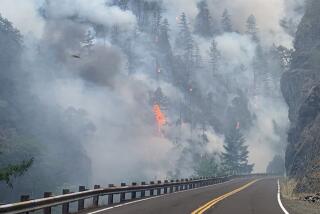PacBell Hunkers Down for El Nino, Hiring 300 to Shimmy Up
- Share via
El Nino fears have fostered a hiring spree at Pacific Bell as the company prepares to protect more than 200,000 miles of phone lines throughout the state if Mother Nature comes calling.
“We are taking seriously predictions that this winter could be among the worst on record and responding accordingly,” said Randy Strahan, president of service operations for Pacific Bell.
By bolstering its work force with 300 more service and maintenance technicians, PacBell hopes to stave off the multimillion-dollar damage that the 1982-83 El Nino wreaked on California utility companies, when gale-force winds and torrential rains tore down power and phone lines, leaving thousands of customers without electricity or phone service.
“Obviously, El Nino heightens our sensitivity to service reliability,” said Chuck Smith, president of network operations. “Los Angeles gets an abnormal share of events such as earthquakes, forest fires and civil unrest. It’s imperative to keep the 911 lines open.”
The new hires will be deployed from Pacific Bell’s emergency operations centers in San Diego and Sacramento. To qualify for the job, aspiring technicians must be at least 18 and able to lift 50 pounds. They must also pass an equilibrium test, which consists of walking 16 feet down a 3-inch-wide plank elevated 6 inches off the ground.
“It’s surprisingly hard to do,” said Smith, adding that 20% of applicants fail.
Those who do pass muster on the beam are admitted to the four-week course, which concentrates on pole-climbing and emergency wire repair.
Shimmying up a 30-foot telephone pole is no easy task. Although some poles are outfitted with metal rods, in rural areas most are unstepped. Technicians must climb both.
“At first, your legs are shaking, but then you gain confidence,” said John Lindsay, PacBell regional manager for northern Los Angeles County, who worked as a lineman for years before taking a corporate post.
During their first climb, some otherwise brave souls discover their acrophobic side, said Richard Mares, a 35-year-old Air Force veteran who is in training in Glendale. Fear of heights forced two of his nine classmates to drop out of the course.
To avoid tumbles, technicians follow the three-point climbing rule: If three points of the body--either two hands and one leg or two legs and one hand--are in constant contact with the pole, you won’t fall.
Additionally, the single most valuable tool for a line worker suspended high above the ground is an 8-pound body belt, a thick leather strap similar to those used by weight lifters, said Mares.
Other accouterments of the trade include long-sleeved shirts to protect against splinters and creosote burns, rubber gloves to guard against electric shocks, safety glasses, hard hats and boots equipped with gaffs (metal spikes) that pierce the wooden poles like a mountaineer’s pick pierces ice.
Surprisingly, most injuries are not from falls but from wear and tear on knee joints after years of climbing, said Lindsay. In fact, last year the company reported only two falls, which is minimal considering that PacBell’s technicians climb poles thousands of times a day, he said.
A more pressing worry is electric shock. Utilities often piggyback phone and power lines on the same poles. But phone terminals--the boxes that connect the main phone cable to individual hookups--emit only 48 volts of electricity, which would give an ungloved technician a slight sting, while power lines can deliver a killer 20,000-volt jolt.
To avoid electrocution, workers test work areas with a voltage detector before ascending.
But for all its dangers and drawbacks, the job does offer rewards, said Sharon Moore, a supervisor at PacBell’s Glendale training facility.
“Most people here just love being outdoors as opposed to being in an office all day,” said Moore.
Sean Martin, 30, a 12-year Army veteran who is undergoing training, agrees. The image of the lone telephone repairman, maintaining a resource that indiscriminately crosses buzzing metropolises and silent forests alike, appeals to him.
“I like the independence of it--your boss isn’t constantly looking over your shoulder,” Martin said. “In the field, you’re on your own.”
More to Read
Sign up for Essential California
The most important California stories and recommendations in your inbox every morning.
You may occasionally receive promotional content from the Los Angeles Times.













